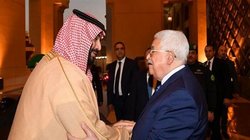 Saudi Crown Prince Mohammed bin Salman has reportedly offered Palestinian Authority (PA) chief Mahmoud Abbas 10 billion dollars in return for accepting US President Donald Trump’s controversial proposal for peace between the Israelis and Palestinians, dubbed “the deal of the century.”
Saudi Crown Prince Mohammed bin Salman has reportedly offered Palestinian Authority (PA) chief Mahmoud Abbas 10 billion dollars in return for accepting US President Donald Trump’s controversial proposal for peace between the Israelis and Palestinians, dubbed “the deal of the century.” RNA - The Lebanese daily Arabic-language newspaper al-Akhbarreported on Tuesday that Abbas turned down the offer, saying supporting the deal would be “the end of his political life.”
Al-Akhbar cited leaked diplomatic reports based on conversations between the two Arab politicians, noting that the reports -- written by Jordanian envoy to Ramallah, Khaled al-Shawabkeh -- were based on briefings with a number of Palestinian officials.
According to the Lebanese newspaper, bin Salman briefed Abbas on the contents of the American proposals during the latter’s visit to Saudi Arabia in December 2017, and asked the Palestinian leader how much his delegation's annual budget was.
“I’m not a prince to have my own entourage,” Abbas replied.
“How much money does the Palestinian Authority, its ministers and employees need?” bin Salman then questioned.
Abbas said that the Palestinians need $1 billion each year, to which the Saudi de facto ruler was said to have responded, “I will give you $10 billion over 10 years if you accept the deal of the century.”
Abbas, however, said no, because if he did, it would “mean the end of my political life.”
Bin Salman also told Abbas that Saudi Arabia and other Arab countries would help them expand their control over Areas B and C in the occupied West Bank, and provide financial support for projects to boost their economy.
“Saudi Arabia will support the Palestinian Authority with more than $4 billion,” the Saudi crown prince reportedly said.
The Palestinian Authority chief highlighted that political realities prevent him from taking the so-called US peace plan, emphasizing that he could not make concessions regarding Israeli settlements, the so-called two-state solution and Jerusalem al-Quds.
Abbas underscored that the Americans would not provide any written proposals, but would adopt a tactic similar to the 1917 Balfour Declaration that led to the Israeli occupation of Palestinian lands.
Trump’s so-called “peace plan” has been dismissed by Palestinian authorities ahead of its unveiling at the end of the holy fasting month of Ramadan and the formation of the new Israeli cabinet, most likely in June.
Speaking in the occupied West Bank city of Ramallah on April 16, Palestinian Prime Minister Mohammad Shtayyeh lashed out at Trump’s initiative, asserting that it was “born dead.”
Shtayyeh noted that negotiations with the US were useless in the wake of the country’s relocation of its embassy from Tel Aviv to Jerusalem al-Quds, which Palestinians consider the capital city of their future state.
847/940